CCNA 4 Module 5 V3.1 Answers
1. How does Frame Relay technology process frames that contain errors? (Choose two.)
Frame Relay services depend on the upper layer protocols to handle error recovery.
It requires the receiving device to request that the sender retransmit erroneous frames.
FECN, BECN, and DE bits are set in the frames to minimize errors.
The receiving device drops any frames that contain errors without notifying the sender.
The frame relay switch notifies the sender that errors were detected.
2. Which statement identifies a reason for using point-to-point subinterfaces in Frame Relay networks?
Subinterfaces overcome routing update and split-horizon issues that occur with multipoint logical interfaces on a single physical interface.
A point-to-point subinterface does not require an IP address and therefore saves address space.
Point-to-point subinterfaces provide greater reliability and reachability in Frame Relay networks by requiring a mesh topology for network configurations.
Point-to-point subinterfaces increase the number of DLCIs that can be configured in a Frame Relay network.
3.
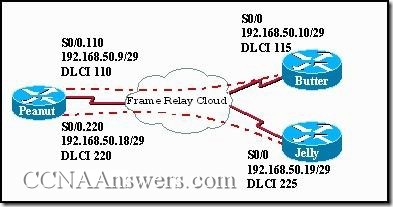
A ping is sent to address 192.168.50.10 from the Peanut router. Which DLCI will be used to send the ping?
110
115
220
225
4. Which data link layer protocol is used to carry frames across a Frame Relay link?
PPP
LAPD
LAPF
Frame Relay
5. Which bits are set in the data frames to request that a device reduce the flow of data sent to or from a Frame Relay switch?
EIR bits
ECN bits
CIR bits
DE bits
Window bits
6. Why are full mesh topologies seldom found in large Frame Relay networks?
Additional hardware is required to achieve the mesh.
The additional virtual circuits slow the link access speeds.
The required number of links becomes prohibitive.
Additional interfaces are required since each can only support 10 virtual circuits.
The speed of transmission slows in inverse proportion to the square of the number of links.
7. Which of the following occurs when the command frame-relay map ip 10.1.1.1 22 is configured on the router? (Choose two.)
DLCI 22 will replace the MAC address in the ARP table for entry 10.1.1.1
The remote circuit with DLCI 22 can receive a ping.
Inverse-ARP will be used to add an entry for 10.1.1.1 into the frame-relay map table using DLCI 22.
Pings to 10.1.1.1 will be sent on the circuit labeled DLCI 22.
The router will use DLCI 22 to forward data to 10.1.1.1.
8. Why is the keepalive mechanism added as an extension to the Local Management Interface in a Frame Relay network?
to identify which routers were experiencing congestion
to verify the status of PVCs in the Frame Relay network
to dynamically map a MAC address to an IP address in a Frame Relay network
to signal to the router the status of the routing protocols configured in the Frame Relay network
9. Which of the following statements are true about a basic Frame Relay WAN connection between a customer and the service provider? (Choose two.)
DTE devices such as routers and FRADs transmit user data.
DTE devices such as Frame Relay switches transport the data between DTE devices.
An Ethernet connection between the router and the frame relay switch allow access to the frame relay network.
Serial connections between the customer and the frame relay network are used to transport data.
The Frame Relay WAN is a mesh of interconnected routers.
10. What is created between two DTEs in a Frame Relay network?
switched parallel circuit
permanent virtual circuit
limited access circuit
ISDN circuit
Frame Relay circuit
11. Which features make Frame Relay technology a cost-effective alternative to a mesh of dedicated leased lines? (Choose three.)
allows a single interface to support multiple PVCs
minimizes the equipment required to be purchased by the customer
requires one router interface for each PVC
provides the customer with redundancy if a single interface goes down
allows the customer to pay for the average bandwidth requirement rather than the maximum bandwidth requirement
12. Which of the following allow the router to map data link layer addresses to network layer addresses in a Frame Relay network? (Choose two.)
ARP
RARP
Proxy ARP
Inverse ARP
LMI status messages
ICMP
13.
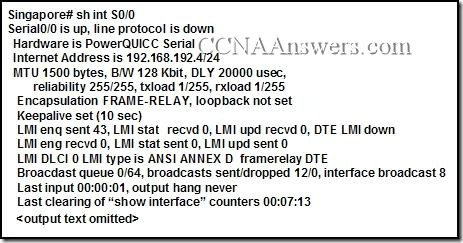
When troubleshooting a Frame Relay connection, an administrator entered the show interfaces s0/0 command and received the output shown in the exhibit. What are two probable reasons for this problem? (Choose two.)
The cable between the CSU/DSU and the router is disconnected.
The serial 0/0 interface is shutdown.
The router is not configured for the same Frame Relay PVC as the switch.
The LMI type on the Frame Relay switch is NOT ANSI.
The address of the Frame Relay switch is not in the routing table.
14.

Which commands were added to the configuration to produce the output shown in the graphic? (Choose two.)
Router(config)# ip route 192.168.192.4 255.255.255.0 17 broadcast
Router(config-if)# frame-relay lmi-type cisco 17
Router(config-if)# frame-relay map ip 192.168.192.4 17 broadcast
Router(config-if)# ip address 192.168.192.4 255.255.255.0 DLCI 17 static
Router(config-if)# interface S0/0.1 point-to-point
Router(config-if)# encapsulation frame-relay cisco
15. What does a DLCI of 1023 indicate about a frame?
The LMI type is ANSI.
The LMI type is IETF.
The LMI type is Cisco.
The LMI type is Q933a.
The encapsulation is Cisco.
The encapsulation is IETF.
16. Which methods are used to minimize heavy traffic on a Frame Relay network? (Choose two.)
FRADs or routers set ECN bits to request that the Frame Relay switch reduce the flow of frames on the link.
Windowing is used to reduce the size of the frames sent across the link.
The Frame Relay switch will drop packets that have the DE bit set.
When a switch sees its queue increasing, it notifies DTEs to reduce the flow of traffic.
When congestion occurs, all frames are dropped until the congestion clears.
17.
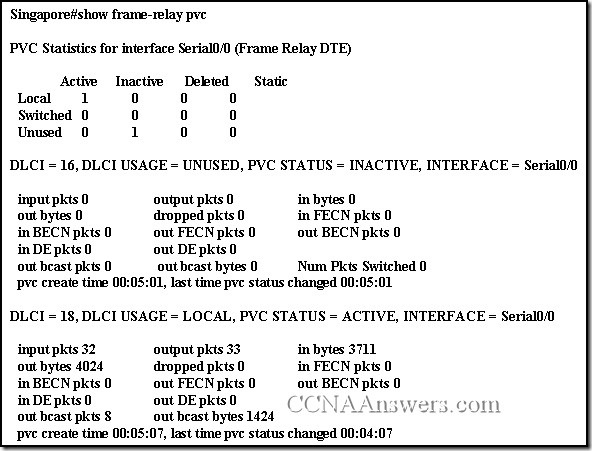
When troubleshooting a frame relay connection, a technician entered the show frame-relay pvc command shown in the graphic. What can be concluded from the output shown in the graphic? (Choose three.)
The output in the debug frame-relay lmi command will indicate status 0x2 for DLCI 18.
DLCI 16 was correctly programmed on the switch, but the remote router may be misconfigured.
The frame relay switch is sending LMI status messages about DLCI 16 to the Singapore router.
Congestion has been experienced on DLCI 18.
Some packets have been set to be dropped if congestion is experienced on the PVC.
18. Which of the following DLCIs are reserved?
16
127
255
1023
2048
19. Which of the following statements regarding multipoint subinterfaces are true? (Choose two.)
A single multipoint subinterface is used to establish PVC connections to multiple physical interfaces on remote routers.
Each multipoint link is in its own subnet.
The physical interface does not have an IP address.
Split-horizon is disabled allowing routing updates to be re-transmitted on every subinterface.
Multipoint subinterfaces require the encapsulation frame-relay command to be issued individually for each subinterface to operate correctly.
20. How is a permanent virtual circuit identified in a Frame Relay network that is carrying IP traffic?
It is given a fixed locally significant identification number.
It is identified by the MAC address of the router interface.
Dynamic virtual channel identifiers are assigned to each frame transmitted across the network.
It is identifed by the MAC address of the switch port.
21. What is the purpose of the FCS field in a Frame Relay frame?
It serves to distinguish one frame from the next.
It is used to signal network congestion.
It is used to detect if the frame has been corrupted and should be discarded.
It determines which VC should be used for transmission.

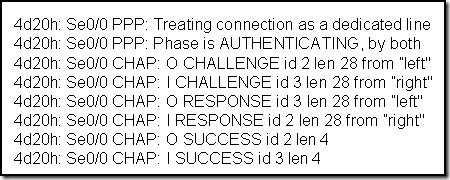
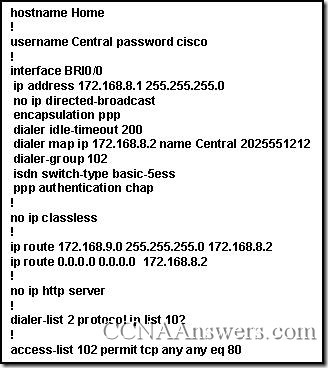
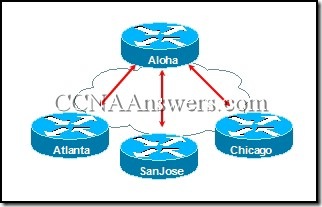

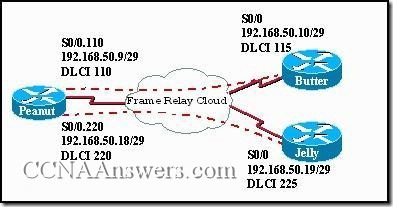
Leave a Reply